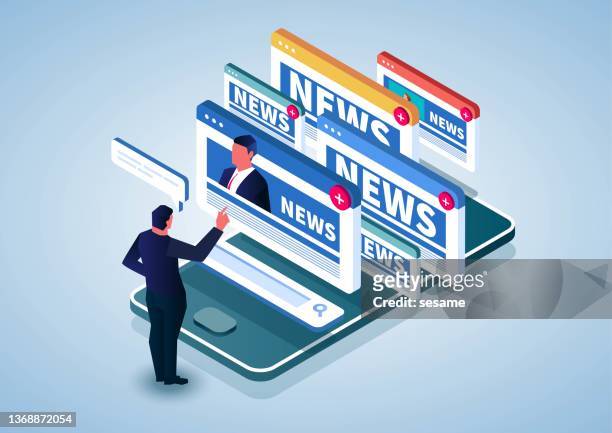The Rise of Subscription Models and How stnews.live Leads the Way
The Importance of Fact-Checking worldwide of News Online
The frequency of misinformation in today's on the internet news landscape has reached disconcerting degrees. Fact-checking organizations play a necessary role in counteracting this fad. They verify insurance claims and boost the reputation of journalism. The efficiency of these companies usually pivots on their methodologies and public assumption. As audiences navigate this intricate atmosphere, the effects of their searchings for may form the future of news intake and count on. What does this mean for the integrity of info progressing?

The Surge of Misinformation in the Digital Age
Just how has the introduction of electronic innovation added to the spread of misinformation? The fast growth of the web and social media platforms has helped with the dissemination of info at an unprecedented rate. Individuals can share articles, videos, and opinions with a plain click, commonly without verifying the material's precision. Algorithms prioritize mind-blowing or emotionally billed material, leading to a proliferation of deceptive narratives that record interest.
In addition, the anonymity paid for by electronic systems enables individuals to spread out false info without liability (stnews.live). Misinformation thrives in echo chambers, where individuals are revealed mostly to point of views that strengthen their ideas, further entrenching falsehoods. The saturation of info can bewilder users, making it challenging to discern qualified resources from unreliable ones. Subsequently, misinformation has actually ended up being a prevalent issue in the electronic landscape, influencing public viewpoint and rely on genuine news resources
The Function of Fact-Checking Organizations
Fact-checking companies play a crucial function in boosting the reliability of journalism by validating cases made in report. Their initiatives are vital in combating misinformation, ensuring that precise details prevails in the electronic landscape. By holding media outlets responsible, these organizations contribute substantially to informed public discussion.
Enhancing Credibility in Journalism
While false information multiplies in the digital age, fact-checking organizations play an important role in enhancing the reputation of journalism. These companies thoroughly verify claims made in news short articles, public declarations, and social networks posts, ensuring that information disseminated to the public is precise and trustworthy. By offering independent assessments, they work as a vital resource for reporters, helping them maintain high requirements of honesty. In enhancement, their efforts advertise openness in media, cultivating public trust fund. As target markets become significantly discerning, the visibility of respectable fact-checking entities can distinguish trustworthy news sources from those that may spread out fallacies. Inevitably, the dedication of fact-checking companies to maintain truthfulness is crucial for the wellness of autonomous discussion.
Combating False Information Effectively
As false information continues to spread out quickly throughout electronic systems, the duty of fact-checking organizations ends up being significantly vital in the fight for precise information. These organizations serve as guard dogs, scrutinizing cases made by somebodies and media outlets to guarantee liability. By employing extensive study approaches and specialist analysis, they validate facts and clear up misleading stories. Their findings are distributed through numerous networks, enlightening the general public and fostering important thinking. In addition, collaborations with social media sites platforms boost their reach, enabling for punctual flagging of incorrect info. As digital proficiency grows, the influence of fact-checking organizations is crucial in equipping target markets to discern truth from fallacy, ultimately adding to an extra enlightened culture.
Exactly How False Information Affects Public Assumption
False information significantly undermines count on media, leading audiences to doubt the reputation of news resources. Because of this, individuals frequently are attracted in the direction of outlets that reinforce their present ideas, contributing to the polarization of point of views. This dynamic produces a fragmented information landscape, where shared comprehending becomes progressively challenging to achieve.
Count on Media

Rely on media has become increasingly delicate in the digital age, where the fast spread of false information can alter public assumption. As misinformation multiplies throughout social media sites and online platforms, audiences often discover it testing to recognize legitimate sources from unreliable ones. This unpredictability fosters hesitation, leading many people to question the objectives behind news coverage. Depend on in established media outlets has actually reduced, as customers progressively transform to alternate resources that might lack strenuous content requirements. This disintegration of depend on not just impacts specific beliefs but likewise threatens the cumulative ability to take part in educated discussions. Inevitably, the integrity of journalism goes to stake, highlighting the important demand for reliable fact-checking to bring back self-confidence in the media landscape.

Polarization of Opinions
The raising uncertainty towards conventional media has added to a growing polarization of point of views among the public. False information, usually disseminated via social networks and online platforms, plays a considerable function fit unique ideological divides. Individuals frequently look for details that aligns with their pre-existing beliefs, strengthening their point of views while rejecting opposing viewpoints. This resemble chamber effect magnifies divisions, causing a fragmented public discourse where consensus becomes increasingly elusive. Additionally, sensationalized narratives thrive in this atmosphere, further skewing public understanding and cultivating suspect in reputable resources. As polarization intensifies, the requirement for effective fact-checking ends up being paramount to link spaces and advertise notified discussions, eventually guaranteeing a much more natural society capable of navigating complex concerns.
Methods for Effective Fact-Checking
Reliable more helpful hints fact-checking relies upon a systematic method that consists of complete research, verification of sources, and crucial evaluation of insurance claims. A fundamental technique is cross-referencing details from several legitimate sources to confirm its precision. Fact-checkers frequently utilize specialized data sources and archives to trace the beginning of specific declarations, guaranteeing that the reported info aligns with recorded proof.
One more essential approach entails looking at the context in which cases are presented. Deceptive info can occur from out-of-context quotations or selective information usage. By checking out the more comprehensive story, fact-checkers can identify potential prejudices or false impressions.
Involving with specialists in relevant fields can offer quality and insight that enhances the fact-checking procedure. This cooperation can uncover subtleties that laypeople may ignore - stnews.live. Ultimately, a disciplined technique incorporating these techniques fosters an extra educated public, improving the dependability of my explanation details disseminated in the electronic age
The Influence of Social Media Site on News Intake
How has social media sites changed the method people take in news? The emergence of systems like Facebook, Twitter, and Instagram has notably altered news usage patterns. News is now shared swiftly, permitting customers to access real-time updates and engage with content through likes, shares, and comments. This immediacy has cultivated a choice for bite-sized info, typically at the expense of comprehensive evaluation.
Moreover, social networks enables personalized news feeds, where formulas curate web content based on individual choices, creating resemble chambers that may limit exposure to varied viewpoints. The duty of standard news outlets has decreased as people increasingly rely upon peer recommendations and trending topics. Consequently, the trustworthiness of info is usually compromised, as sensationalism can outweigh valid reporting. Overall, social media has reshaped news consumption, highlighting rate and customization while testing the standards of journalistic integrity.
Encouraging Audiences to Identify Dependable Resources

Furthermore, analyzing the authorship and organizational history of newspaper article can disclose possible prejudices. Cross-referencing info throughout several reliable outlets even more enhances the verification process. Using digital tools, such as browser expansions that rate the integrity of sites, can additionally aid in recognizing credible info. By proactively engaging with these sources and cultivating a critical frame of mind, target markets can much better equip themselves to discern trusted news sources, inevitably fostering a much more enlightened culture in the middle of the complexities these days's media atmosphere.
The Future of Journalism and Fact-Checking
As more tips here the media landscape evolves, the future of journalism and fact-checking deals with both tests and opportunities. The rise of digital systems has actually democratized info dissemination, enabling varied voices to emerge. However, this has likewise resulted in the expansion of false information, requiring durable fact-checking mechanisms. Journalists will progressively depend on innovation, including AI tools, to verify realities swiftly and successfully.
Collaboration in between wire service and fact-checking entities is expected to enhance reputation and openness. Target market involvement will certainly play an essential role, as educated viewers end up being significant companions in recognizing trustworthy content.
The demand for liability and precision is most likely to expand, pushing journalists to support high standards in their reporting. Ultimately, the future of journalism might depend upon its ability to adjust to technical improvements while keeping journalistic honesty, guaranteeing that fact-checking continues to be a cornerstone of trustworthy news.
Regularly Asked Concerns
Just How Can I Report False Information I Run Into Online?
To report false information encountered online, individuals can make use of platform-specific reporting devices, supply clear evidence, and share the info with fact-checking companies. Engaging with community discussions can also assist raise understanding regarding the misinformation.
What Are Common Indicators of False Information in News Articles?
Common indicators of misinformation in news articles include marvelous headlines, absence of legitimate resources, emotional language, irregular facts, and lack of writer credentials. Readers should seriously review web content for these indications to determine precision.
How Do Fact-Checkers Verify Sources?
Fact-checkers validate sources by cross-referencing info with trustworthy data sources, seeking advice from professionals, and examining the original context of insurance claims. They likewise examine the dependability of the sources, making certain precise and reliable details for public usage.
What Lawsuits Can Be Taken Against False information?
Legal actions against false information may include disparagement lawsuits, cease-and-desist orders, and governing penalties. Sufferers can seek redress via civil courts, while some territories impose penalties or permissions on platforms disseminating incorrect information.
Are There Apps for Fact-Checking News On-The-Go?
Countless applications exist for fact-checking news on-the-go, including Snopes, FactCheck.org, and PolitiFact. These applications aid users confirm claims promptly, promoting informed decision-making and fostering a more discerning strategy to consuming news in real-time.